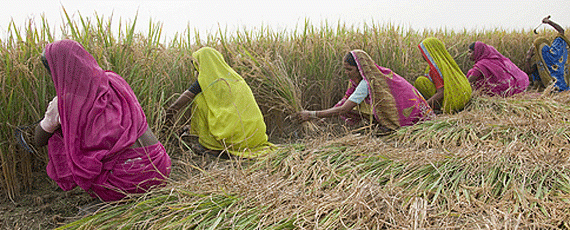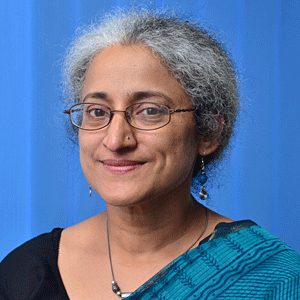Nitya Rao puts spotlight on gender for LANSA

Nitya Rao explains why she joined LANSA
I joined the LANSA team with the hope that I could contribute in a meaningful way to the research agenda. I would like to help ask and perhaps answer some of the critical questions around the persistent enigma of agricultural production alongside severe malnutrition in some of the poorest parts of south Asia. This question cannot be explained in technical or linear ways, but needs to be grounded in people’s lives, in social and gender identities that continue to shape both opportunities and choices. Such a disaggregated, fine-grained, micro-analysis, located within macro-contexts, could help provide insights that enable policy makers and development practitioners to support the everyday struggles of the marginalised to realise better lives.
 I began my career in 1985 with the Self Employed Women’s Association in India. I helped organise home-based women workers in eastern Madhya Pradesh to claim fair wages, adequate work and the fulfilment of basic rights to education, health and minimum support services. Men, women and children within households were struggling for survival – productive work was not really a choice. Women additionally had the responsibility for all domestic and care tasks. I later got involved with issues of land and resources, supporting women quarry workers in Tamil Nadu to gain some control over the quarries in which they were employed as labour and women head-loaders of firewood in Jharkhand to sustain their livelihood. Over a decade of helping to mobilise people, the importance of secure access to productive assets for the poor, with equal rights for men and women, became apparent to me.
I began my career in 1985 with the Self Employed Women’s Association in India. I helped organise home-based women workers in eastern Madhya Pradesh to claim fair wages, adequate work and the fulfilment of basic rights to education, health and minimum support services. Men, women and children within households were struggling for survival – productive work was not really a choice. Women additionally had the responsibility for all domestic and care tasks. I later got involved with issues of land and resources, supporting women quarry workers in Tamil Nadu to gain some control over the quarries in which they were employed as labour and women head-loaders of firewood in Jharkhand to sustain their livelihood. Over a decade of helping to mobilise people, the importance of secure access to productive assets for the poor, with equal rights for men and women, became apparent to me.
My work in Jharkhand since the mid-90s was a turning point in my life and career. I witnessed first-hand chronic food insecurity and severe malnutrition. In the forested and hilly terrain, while households all had land and cultivated rice and maize, this was barely enough for half the year. Some greens and fruits could be collected from the forest and black-eyed beans grown on the hill-tops. A few pigs and chicken were raised for a special treat on festive occasions. Drinking water had to be collected from a spring in the nearby stream, flooded during the monsoons. The children had rickety legs and bloated stomachs – signs of severe protein and vitamin deficiencies. They were constantly falling ill, prone to malaria and kalazar. Rates of mortality were high. Yet indigenous knowledge of medicine or nutrition had all but disappeared; dependence on half-baked western medicine imparted by ‘quacks’ or untrained and unregistered medical practitioners was the norm. Rich in vitamins and minerals, Moringa Oleifera was in abundance. I cooked the leaves in my own meals, yet hardly anyone else did.
Given the multiple disadvantages faced by women, in particular poor women, in the public domain, I have been interested in understanding gender relations and identities and how these mediate all negotiations involved in the daily business of survival and making a living, be it through the gender division of labour, differential access to and distribution of resources, or public and political voice. Gender is not just about the relationships between men and women per se, but equally how these are shaped by other intersecting identities of class, ethnicity, location, age, marital status, education and so on. Working with LANSA, I am helping researchers seriously consider the complexities of social and gender analysis in their research studies, with a view to unpacking the relationships between production and reproduction that underlie poor nutritional outcomes, and thus pointing to new intervention possibilities.
Nitya Rao is Professor of Gender and Development at the School of International Development at UEA. She provides the crosscutting gender inputs to the entire LANSA programme.







